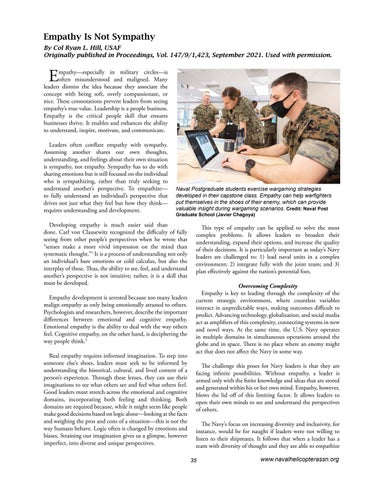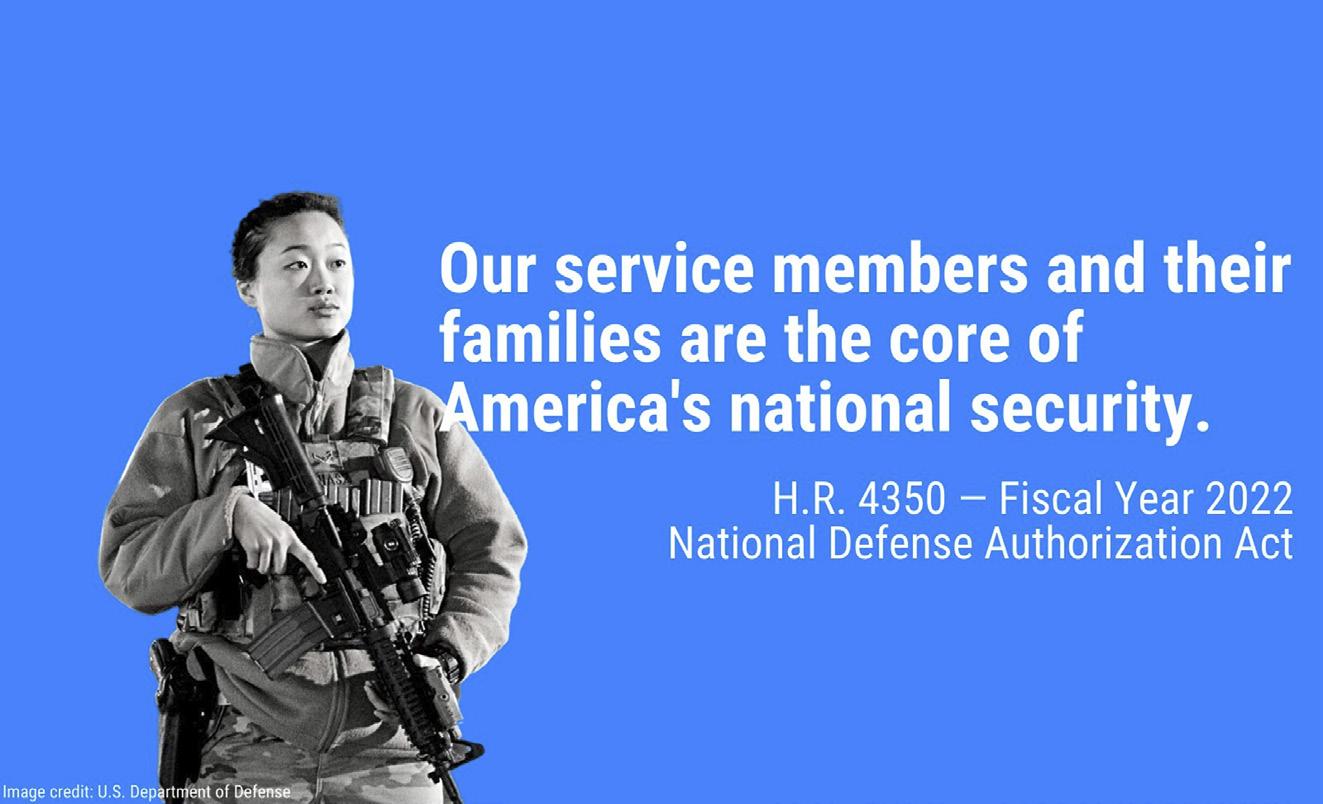Empathy Is Not Sympathy By Col Ryan L. Hill, USAF Originally published in Proceedings, Vol. 147/9/1,423, September 2021. Used with permission.
E
mpathy—especially in military circles—is often misunderstood and maligned. Many leaders dismiss the idea because they associate the concept with being soft, overly compassionate, or nice. These connotations prevent leaders from seeing empathy’s true value. Leadership is a people business. Empathy is the critical people skill that ensures businesses thrive. It enables and enhances the ability to understand, inspire, motivate, and communicate. Leaders often conflate empathy with sympathy. Assuming another shares our own thoughts, understanding, and feelings about their own situation is sympathy, not empathy. Sympathy has to do with sharing emotions but is still focused on the individual who is sympathizing, rather than truly seeking to understand another’s perspective. To empathize— to fully understand an individual’s perspective that drives not just what they feel but how they think— requires understanding and development.
Naval Postgraduate students exercise wargaming strategies developed in their capstone class. Empathy can help warfighters put themselves in the shoes of their enemy, which can provide valuable insight during wargaming scenarios. Credit: Naval Post Graduate School (Javier Chagoya)
Developing empathy is much easier said than done. Carl von Clausewitz recognized the difficulty of fully seeing from other people’s perspectives when he wrote that “senses make a more vivid impression on the mind than systematic thought.”1 It is a process of understanding not only an individual’s bare emotions or cold calculus, but also the interplay of these. Thus, the ability to see, feel, and understand another’s perspective is not intuitive; rather, it is a skill that must be developed. Empathy development is arrested because too many leaders malign empathy as only being emotionally attuned to others. Psychologists and researchers, however, describe the important differences between emotional and cognitive empathy. Emotional empathy is the ability to deal with the way others feel. Cognitive empathy, on the other hand, is deciphering the way people think.2 Real empathy requires informed imagination. To step into someone else’s shoes, leaders must seek to be informed by understanding the historical, cultural, and lived context of a person’s experience. Through these lenses, they can use their imaginations to see what others see and feel what others feel. Good leaders must stretch across the emotional and cognitive domains, incorporating both feeling and thinking. Both domains are required because, while it might seem like people make good decisions based on logic alone—looking at the facts and weighing the pros and cons of a situation—this is not the way humans behave. Logic often is changed by emotions and biases. Straining our imagination gives us a glimpse, however imperfect, into diverse and unique perspectives.
This type of empathy can be applied to solve the most complex problems. It allows leaders to broaden their understanding, expand their options, and increase the quality of their decisions. It is particularly important as today’s Navy leaders are challenged to: 1) lead naval units in a complex environment; 2) integrate fully with the joint team; and 3) plan effectively against the nation’s potential foes. Overcoming Complexity Empathy is key to leading through the complexity of the current strategic environment, where countless variables interact in unpredictable ways, making outcomes difficult to predict. Advancing technology, globalization, and social media act as amplifiers of this complexity, connecting systems in new and novel ways. At the same time, the U.S. Navy operates in multiple domains in simultaneous operations around the globe and in space. There is no place where an enemy might act that does not affect the Navy in some way. The challenge this poses for Navy leaders is that they are facing infinite possibilities. Without empathy, a leader is armed only with the finite knowledge and ideas that are stored and generated within his or her own mind. Empathy, however, blows the lid off of this limiting factor. It allows leaders to open their own minds to see and understand the perspectives of others. The Navy’s focus on increasing diversity and inclusivity, for instance, would be for naught if leaders were not willing to listen to their shipmates. It follows that when a leader has a team with diversity of thought and they are able to empathize 35
www.navalhelicopterassn.org





































